Dubai – Gul Begum, a chronic diabetes patient and Pakistani living in the UAE, has been visiting the medical center at the Pakistan Association Dubai (PAD) for the last five years, where she attends a free medical camp once a month and can get the care she needs in a language she understands.
The initiative has treated approximately 26,000 needy patients from all nationalities and backgrounds, free of cost since 2009.
By December this year, the same free service will be provided in what will be the GCC’s first non-profit health care facility to be put together by any expat community: the Pakistan Medical Center (PMC), a 24/7 facility built brick-by-brick by Pakistani expats.
“Besides diabetes, I have high blood pressure too and am so happy that I get treated free of cost and medicine is not charged,” Gul said.
The campaigning to raise funds for the center is also being done through a unique concept. The ‘own-a-brick’ initiative offers community members the opportunity to sponsor 17,000 bricks, with each brick costing AED1,000. The total cost of construction is estimated at AED17 million, with over 80 percent of the work already completed, according to PAD officials.
“We hope that by November, we will have all licensing procedures in place so that we can have a formal opening soon after,” Dr. Feisal Ikram, the president of PAD, told Arab News, and added that the center would be open for all nationalities as part of the UAE’s vision of tolerance and social cohesion.
“Once they donate, the members become part of the center for 10 years which makes them feel that they own the center,” Ikram said and added that the facility and its fundraising were an opportunity for greater community building.
“We are not only asking for money but also engaging the community at all levels and giving them an opportunity to be part of a bigger organization and project,” he said.
Another AED 2.8 million is still needed to complete the center, with a fundraising campaign planned for a later stage to cover operational costs, officials said.
Dr. Nighat Aftab, President of PAD’s Medical Wing, said the initiative to treat people for free had begun years ago as a small initiative every month by a handful of doctors.
“We started seeing patients with chronic and acute diseases such as diabetes, cardiac issues, hypertension, children with fever and dental problems and so on, on the last Friday of every month,” she said.
And then word got around.
When the free medical camp started, Aftab said it was attended by about 150 people and tended to by 15 doctors. The number of people has now increased to nearly 400, with roughly 40 volunteer doctors.
“We thought, what if we could give more services? And then the law was changed... allowing a social club to have medical services,” Aftab said, with that idea now taking shape in the form of PMC.
Besides medical experts, a huge number of students, women and other residents also volunteer their time at the center and medical camp.
Pakistani citizen Ahmed and his wife, Jamila, said they have been coming to the center from Sharjah for the last seven years.
“My wife has diabetes so she needs regular checkups...here she gets free medicine sometimes for a month, and other times for three months which helps relieve a huge burden,” he said.
While the community has helped raise funds, Pakistani celebrities have also endorsed the cause. This month, famed Pakistani writer and poet, Anwar Maqsood, will be holding an evening of prose and poetry at the center.
In an earlier visit to Dubai, Maqsood said, “It’s such a proud feeling to see Pakistanis build a center for themselves, brick by brick. This building will give you a sense of ownership and your generations will take pride in claiming their parents were part of such a great cause.”
Other celebrities such as Pakistani cricketer Shahid Afridi and actor Bushra Ansari have also lent their support to the center.
Speaking on the occasion of the 79th National Day of Pakistan, the UAE’s Minister of Tolerance, Shaikh Nahyan Bin Mubarak Al Nahyan said, “I admire your initiative in establishing the PMC and commend the spirit of tolerance that will be at the heart of its operations.”
“The new center will welcome all people who seek medical help, irrespective of their nationality, ethnicity, religious or philosophical beliefs, gender, political views, economic status, or age,” he said.
Pakistani expats build the region’s largest non-profit health facility in Dubai
Pakistani expats build the region’s largest non-profit health facility in Dubai
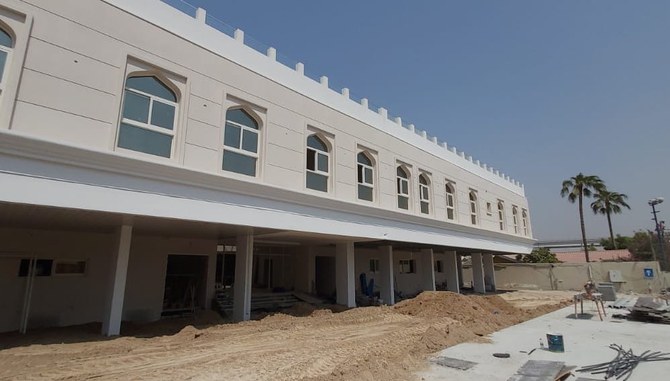
- PMC is the region’s first health care center put together by any expat community, and open to all nationalities
- The project is almost complete and has been widely endorsed by celebrities and media personalities
New Zealand outclass Pakistan to win 4th T20I
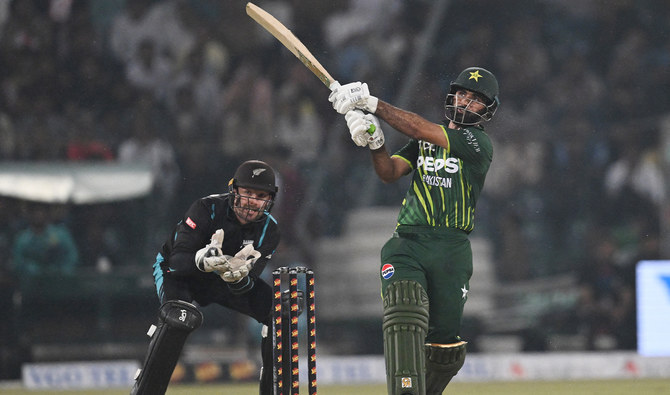
- Opener Tim Robinson hit a half-century to ensure New Zealand reached 178-7 in 20 overs
- Pacer William O’ Rourke returned figures of 3-27 to keep Pakistan down to 174-8 in 20 overs
LAHORE: Experienced allrounder Jimmy Neesham kept his cool to defend six off the last ball to clinch a four-run victory for New Zealand on Thursday in the fourth Twenty20 international against Pakistan in Lahore.
Pakistan needed 18 off the last over in their chase of 179 but Neesham came out in flying colors despite being hit for a boundary off the first ball, giving a packed Qaddafi Stadium crowd heartbreaks.
Opener Tim Robinson hit a maiden half century to lift New Zealand to 178-7 in 20 overs before pacer William O’Rourke claimed 3-27 to keep Pakistan down to 174-8.
Returning allrounder Imad Wasim (22 not out) managed to hit the last ball for a single as New Zealand take an unassailable 2-1 lead in the five-match series with the last game on Saturday, also in Lahore.
Pakistan also lost the third match by seven wickets after winning the first by the same margin while the first match was abandoned after just two balls — all three in Rawalpindi.
The defeats are a jolt to a full-strength Pakistan side in their preparations for the Twenty20 World Cup to be held in the United States and the West Indies in June.
New Zealand, missing a host of players due to Indian Premier League, injuries and unavailability, can feel elated at their bench strength going into the World Cup.
Pakistan sensed they were in with a chance when Fakhar Zaman, who made 45-ball 61 with three sixes and four boundaries, lifted Pakistan from 79-4 with a 59-run stand for the fifth wicket with Iftikhar Ahmed who made a 20-ball 23.
But O’Rourke, playing only his fourth T20I, dismissed Ahmed to add to his wickets of Babar Azam (five) and Saim Ayub (20) to give New Zealand a boost.
Fellow pacer Ben Sears (2-27) claimed Zaman’s wicket with 33 needed off 14 balls.
Earlier, Robinson batted with aggression.
Robinson’s 36-ball 51 with two sixes and four fours lifted New Zealand — who were sent in to bat — to 93-1 in 10 overs before Abbas Afridi’s career best 3-20 helped Pakistan pull back.
New Zealand started briskly with Robinson and Tom Blundell, who made 28 off 15, putting on 56 for the opening stand in five overs.
But from 94-1 New Zealand lost three wickets, including that of dangerman Mark Chapman for eight, as Pakistan’s fielders held catches to back some good bowling by Abbas.
Dean Foxcroft chipped in with 34 off 26 deliveries and skipper Michael Bracewell added 27 to keep the scoreboard ticking as New Zealand managed 43 in the last five overs.
Pakistan were forced to make five changes as wicketkeeper-batter Mohammad Rizwan and Muhammad Irfan Khan were injured while they rested Shaheen Shah Afridi, Naseem Shah and Abrar Ahmed.
Pakistani, US officials discuss ways to enhance bilateral trade and investment
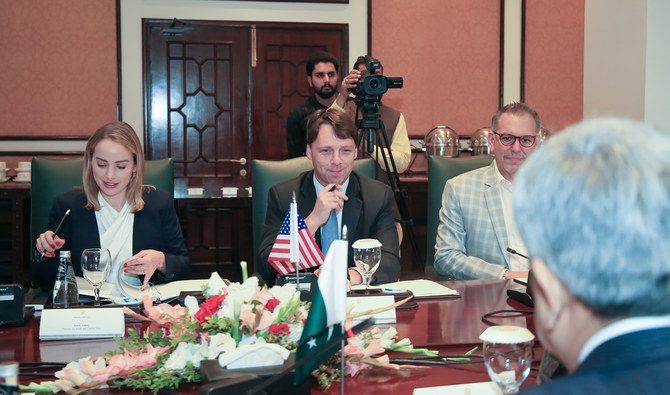
- Pakistani, American officials hold inter-sessional meeting under Trade and Investment Framework Agreement
- Both sides discussed regulatory practices, digital trade, textiles and investments, says US Embassy in Pakistan
KARACHI: Pakistani and American officials held an inter-sessional meeting under the Trade and Investment Framework Agreement (TIFA) on Thursday, with both sides discussing options to enhance bilateral trade and investment, the US Embassy in Islamabad said in a statement.
TIFA serves as a platform for Pakistan and the US to improve market access, promote bilateral trade and investment, resolve trade disputes, and work on trade-related issues between the two countries.
Pakistan and the US took part in high-level trade talks in Feb. 2023 when both countries participated in the 9th Pakistan-United States Trade and Investment Framework Agreement (TIFA) Council meeting. That meeting took place after seven years.
As per a statement by Acting US Mission Spokesperson Thomas Montgomery, both sides discussed a “broad range of areas” to enhance bilateral trade and investment on Thursday.
“The dialogue focused on good regulatory practices, digital trade, the protection of intellectual property, women’s economic empowerment, labor, textiles, investment, and agricultural issues,” Montgomery said.
He added the discussions also included progress on access for US biotechnology products and beef.
The US official said that the meeting was key for both countries to move forward on shared goals of deepening their economic relationship.
“The United States has long been Pakistan’s largest export market, with potential for further growth,” he said, adding that the US has been a leading investor in Pakistan for the past 20 years.
Pakistan’s relationship with Washington has experienced fluctuations over the decades, characterized by periods of close partnership and notable estrangement.
Despite Islamabad’s recent initiatives to enhance and deepen its ties with Washington, until recently, President Joe Biden’s administration had remained reluctant to engage with Pakistan’s top leadership.
Ties between the two countries have improved since former prime minister Imran Khan’s government was ousted via a parliamentary vote on Apr. 2022. Khan had accused Washington of colluding with his political rivals to oust him from power via a “foreign conspiracy.” Washington has consistently denied the allegations.
Pakistan’s defense minister rejects claim ex-PM Khan being pressurized to accept ‘deal’
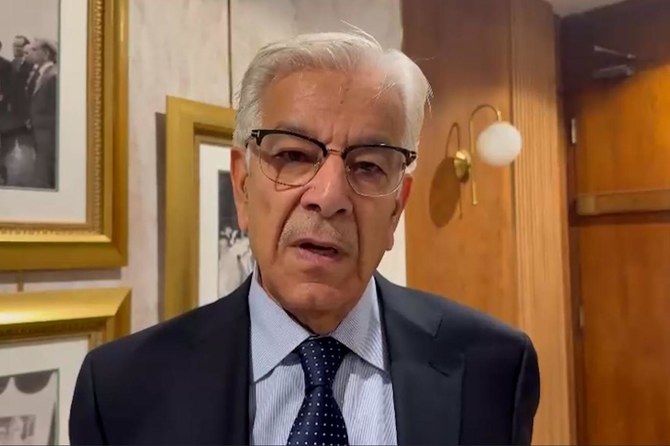
- Chairman of Khan’s party this week said cricketer-turned-politician was being kept in jail so he would agree to a “deal” with the government
- Khan, who has been in jail since August last year after multiple convictions, has vowed not to agree to a “deal” with his political adversaries
ISLAMABAD: Pakistan’s Defense Minister Khawaja Muhammad Asif on Thursday rejected claims that former prime minister Imran Khan was being pressurized to accept a “deal” and come to the negotiating table with the government.
Khan, who was prime minister from 2018-2022, remains jailed in multiple cases, including a 14-year jail sentence for him and his wife for the illegal sale of state gifts. Khan fell out with Pakistan’s powerful military after he was ousted from office via a parliamentary vote in Apr. 2022.
Asif was responding to PTI Chairman Barrister Gohar Khan’s interaction with reporters on Tuesday when he said that the way the former prime minister and his wife were being kept in jail, “these are all [forms of] pressure that Khan somehow agrees to a deal.”
Speaking exclusively to Independent Urdu, Asif rejected claims Khan was being pressurized to come to the negotiating table.
“There is no such thing,” Asif said, claiming that PTI leaders were issuing such statements to stay relevant. “That is why these statements are being issued. There is no truth to them.”
Asif said senior members of the PTI had given statements recently rejecting the possibility of a deal with the government.
“Now if their leadership is issuing contradictory statements themselves, then what comment do we give on it,” he said. “I think their contradictory statements are validating our point.”
Khan’s multiple convictions mean he is banned from holding public office and ruled the 71-year-old out of general elections earlier this year. Arguably Pakistan’s most popular politician, Khan says all cases against him are motivated to keep him out of politics.
Elephant Madhubala to be shifted to Karachi’s Safari Park in May— state media
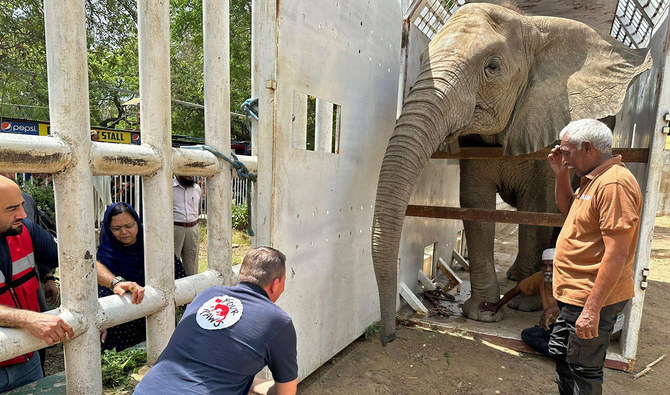
- Madhubala has been in solitary confinement since April 2023 when her companion, elephant Noor Jehan, died
- International animal rights organization warns solitary confinement has taken a toll on Madhubala’s mental health
ISLAMABAD: Pakistani elephant Madhubala, who has been in solitary confinement at Karachi Zoo since last year, will be shifted to Karachi’s Safari Park in May where she will be in the company of two other elephants, state-run media Associated Press of Pakistan reported on Thursday.
Madhubala, one of only three captive elephants alive in Pakistan, was brought to the South Asian country with three other elephants from Tanzania in 2009. However, has been in solitary confinement at Karachi Zoo since April 2023 after her companion, elephant Noor Jehan passed away from illness.
International animal rights organization FOUR PAWS, which has been involved in efforts to have Madhubala relocated to Karachi Safari Park, said last week the solitary confinement has taken a strong toll on her mental condition, with boredom being her biggest stressor.
Animal rights activists have long campaigned against the plight of animals in Pakistan, especially elephants, and demanded they be shifted to “species-appropriate” locations such as the Safari Park.
“According to Zoo administration, the arrangements for the transfer have been completed,” APP said. “Madhubala will join two other elephants, Sonia and Malika after relocation to Safari Park.”
A FOUR PAWS spokesperson said the organization was thrilled to see Madhubala finally getting the treatment she deserves.
“Her story is a testament to the power of collaboration and the importance of animal welfare,” the spokesperson was quoted as saying by APP.
FOUR PAWS says the elephant enclosures at Safari Park would have water elements for bathing, skincare and thermoregulation. Enrichments such as hay nets, varying substrates like soil, sand, clay, and sawdust will be provided for Madhubala to dust bathe while the area is secured by elephant-proof fencing.
Madhubala will be carried from the Karachi Zoo to the Safari Park in a huge transport crate. The elephant is currently being trained to enter and exit the crate by herself and sit inside it.
‘Politically motivated’: Pakistan rejects US State Department report on rights abuses
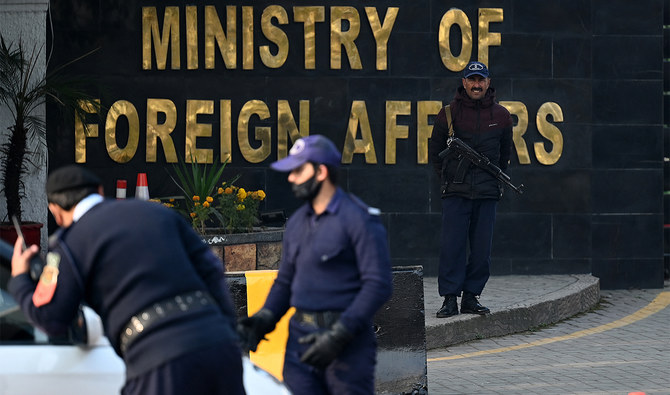
- Annual assessment identified arbitrary detentions, extrajudicial killings, enforced disappearances
- Pakistan government and state agencies deny involvement in missing persons cases, other rights abuses
ISLAMABAD: Pakistan said on Thursday it “categorically” rejected the 2023 country report on human rights practices issued by the US State Department, saying the report was politically motivated, lacking in objective evidence and followed an agenda of “politicization of international human rights.”
The annual human rights assessment released earlier this week identified arbitrary killings, extrajudicial killings, enforced disappearance, torture and “cases of cruel, inhuman, or degrading treatment or punishment by the government or its agents” in Pakistan last year.
The report also said the government “rarely took credible steps” to identify and punish officials who may have committed rights abuses.
“The contents of the report are unfair, based on inaccurate information and are completely divorced from the ground reality,” the Pakistani foreign office said in a statement, adding that the assessment used a “domestic social lens to judge human rights in other countries in a politically biased manner.”
“This year’s report is once again conspicuous by its lack of objectivity and politicization of the international human rights agenda. It clearly demonstrates double standards thus undermining the international human rights discourse.”
The foreign office said it was “deeply concerning” that a report purported to highlight human rights issues around the world was ignoring or downplaying the “most urgent hotspots of gross human rights violations” like Gaza and Kashmir. It also called on the US demonstrate the “requisite moral courage” to speak the truth about all situations and play a constructive role in supporting international efforts to end human rights violations.
“In line with its constitutional framework and democratic ethos, Pakistan remains steadfast in its commitment to strengthen its own human rights framework, constructively engage to promote international human rights agenda, and uphold fairness and objectivity in the international human rights discourse,” the FO added.
Political leaders, rights groups and families of victims have long accused the government, the army and intelligence agencies of being behind cases of arbitrary detentions, extrajudicial killings and enforced disappearances, among other rights abuses. Families say people picked up by security forces on the pretext of fighting militancy or crime often disappear for years, and are sometimes found dead, with no official explanation. Pakistani state agencies deny involvement in such cases.
On Tuesday, Pakistan’s law minister said the government would reconstitute a committee to address enforced disappearances, hours after the release of the US report.
“Now the work is being initiated on this again on the directives of the prime minister. A committee is going to be reconstituted, there will be parliamentary presence in that committee,” Law Minister Azam Nazeer Tarar said.
“There is no lack of seriousness on the government’s part to resolve this issue.”










